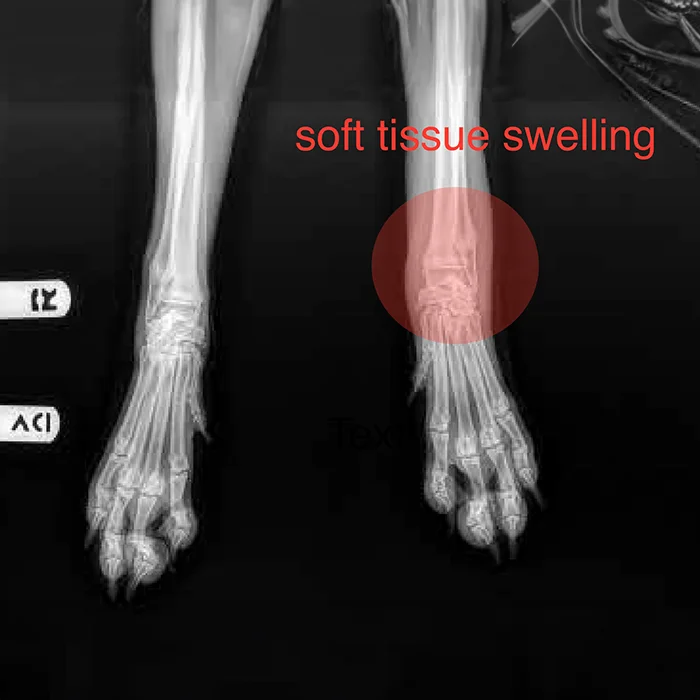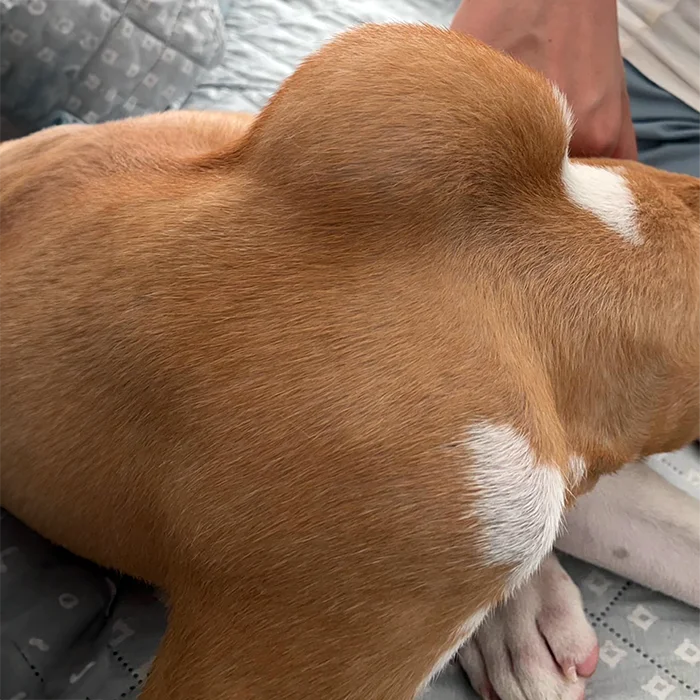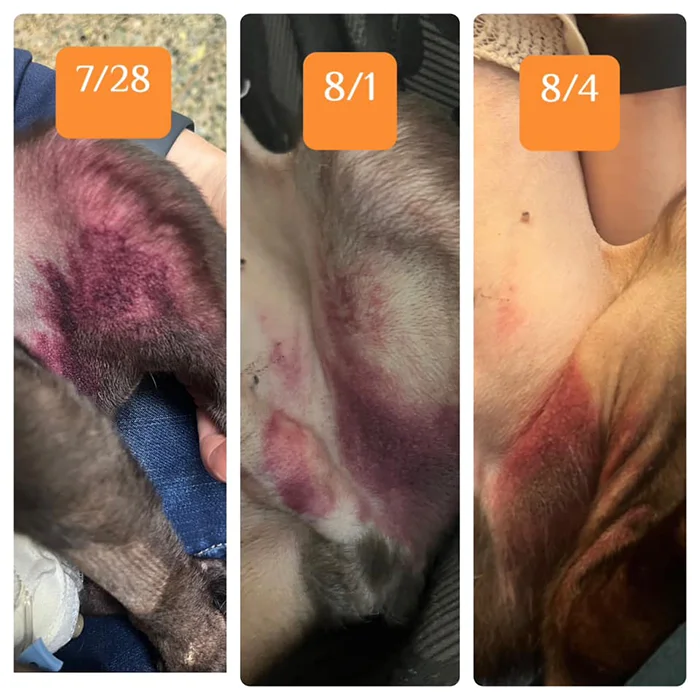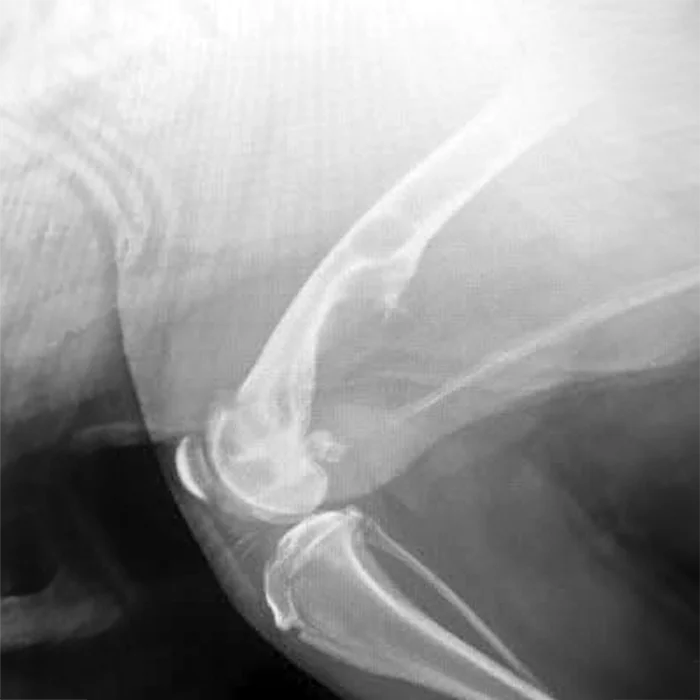For Veterinarians
HEMOPHILIA A
Hemophilia A is a rare, X-linked, genetic deficiency of clotting factor VIII. These dogs usually have a normal PT and a slightly prolonged aPTT. A Cornell Coagulation panel is necessary to confirm the diagnosis.
To treat active bleeding this dog needs:
BEST: Transfusion with cryoprecipitate
GOOD: Transfusion with plasma
OK: Whole blood transfusion
Transfusion guidelines: Transfusion Guidelines

Patients may have hematomas in the thorax or abdomen that create a mass like effect on ultrasound.
Patients commonly have joint pain secondary to intra-articular bleeds.

Patients may get large hematomas from subcutaneous injections such as vaccines, microchips, and SQ medications

Patients may have marked bruising from venipuncture that takes weeks to resolve.

Patients may have bone hemophilic pseudotumors that appear lytic from the cystic effect of the bleed Link to study:
https://pubmed.ncbi.nlm.nih.gov/28763522/
Medications to avoid or use with caution:
- *Apoquel, a tyrosine kinase inhibitor, can have effects in other body systems, including the coagulation cascade. Here is a review article that addresses their role in thrombogenesis (ARTERIAL THROMBOTIC COMPLICATIONS OF TYROSINE KINASE INHIBITORS
- Aspirin (NSAID)
- *Carprofen (NSAID)
- Clopidogrel (Plavix)
- Deramaxx (NSAID)
- Desmopressin: DDAVP causes the release of von Willebrand’s antigen from the platelets and the cells that line the blood vessels where it is stored. It won’t help with hemophilia.
- *Fluoxetine: Serotonin antagonist and reuptake inhibitors are contraindicated with bleeding disorders.
- *Galliprant (NSAID)
- Heparin
- *Meloxicam (NSAID)
- *NSAIDs should be avoided because they can disrupt platelet function and increase risk of bleeding. They can also cause GI bleeding as a potential side effect. A 2022 study (in humans) found it may be safe to use with hemophiliacs, but more research is needed. https://www.ajmc.com/view/nsaids-may-be-safe-for-use-in-hemophilia-but-more-research-is-needed
- Onsior (NSAID)
- pRBC transfusions- there are no clotting factors in packed red cells. (Fresh frozen plasma includes all 13 clotting factors. Cryoprecipitate includes clotting factor VIII, von Willebrand factor (vWF), fibrinogen, factor XIII, and fibronectin.)
- Trazodone: Serotonin antagonist and reuptake inhibitors are contraindicated with bleeding disorders.
- Vitamin K supplements or injections: Vitamin K is only involved in the production of clotting factors 2, 7, 9, and 10. It is not involved in the production of factor 8. The amount in regular dog food is sufficient. Overdose can cause hemolytic anemia.
*Medications with an asterisk have been used without incident in hemophiliac dogs used for research at University of North Carolina*
Approved drugs for hemophiliacs with joint or other pain, or active bleeding:
- Gabapentin
- Ice packs (wrapped in a thin towel, do not apply directly to skin)
- Opioids
- Pregabalin
- Tramadol
- Tranexamic Acid (off label): 15-25mg/kg orally every 8 hours for three to five days during an active bleed. Human tablets available in 650 mg size. It reduces bleeding by inhibiting the breakdown of fibrin, so not directly helping with factor VIII deficiency but reported to be helpful by reducing the need for factor VIII. More potent than Aminocaproic acid. Emetogenic (induces vomiting) at higher (50mg/kg) doses.
- Amantadine
- Tranexamic Acid tablets crushed- powder packed into sockets of bleeding teeth. Can mix with Aquaphor to create a paste for skin wounds.
Medications that may or may not help:
- Aminocaproic Acid (off label): 10-50mg/kg orally every 8 hours. It reduces bleeding by inhibiting the breakdown of fibrin, so not directly helping with factor VIII deficiency but anecdotally reported to be helpful for some patients.
- Yunnan Baiyao works by activating platelets, not clotting factors, so not likely to be of benefit in bleeding from hemophilia, but anecdotally some pet owners find it helpful.
- Black cohosh (can cause GI upset)
- Bones (can cause tooth fractures and also high in fat and can cause colitis/pancreatitis)
- Bromelain (can cause GI upset)
- Cat’s claw (prevents platelet aggregation)
- Dairy (dogs over eight weeks old are lactose intolerant, so can cause GI upset)
- Feverfew (can cause oral ulcers)
- Fish oil at high doses (prevents platelet aggregation). The amount of fish oil in commercial dog food is acceptable, except for prescription diets for arthritis or allergies which contain more Avoid: Royal Canin Mobility Support, Hills j/d, Hills d/d, ProPlan JM, ProPlan DRM, Blue Buffalo W+M, Blue Buffalo Jolly Joints.
- Garlic (can damage red blood cells)
- Ginger (can cause GI upset)
- Ginkgo biloba (prevents platelet aggregation)
- Onion, leeks, chives, scallions, shallots (can damage red blood cells)
- Papain (Papaya enzyme also used for meat tenderizer and in some dog dental products has anticoagulant properties that can increase bleeding risk).
- Pau d’arco (prevents platelet aggregation
- Pineapple (see bromelain above)
- Vitamin E at high doses (prevents platelet aggregation)
